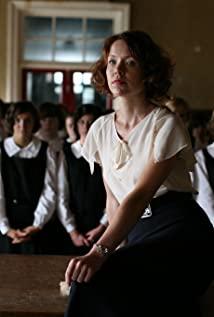The story has three intertwined threads, one is that we start to know the north from the perspective of a southerner as the Hale family moves to the north, the second is the misunderstanding of the acquaintance and the end of the family between the hero and the heroine, and the third is the gap between the rich and the poor, hiring/being employed Relationship, or class struggle, and the ending of the story is due to the angelic heroine, all three clues are perfectly drawn in the shape of a rose-colored peach heart.
The heroine is an image that British female writers like to create, has her own ideas, is sometimes blunt and out of place, upright and kind, a little out of tune with the upper class, some characters in the play always dislike her, and at the same time all readers Everyone thinks she's cute. I think the BBC casting is very suitable. This actress has the feeling of a British classical beauty, and the restraint and restraint of taking the British as a standard at that time also showed a good performance.
The male protagonist is a very contradictory image, I don't know the author's social class, but obviously, as a northern factory owner, Thornton is a vampire in the eyes of workers on the one hand, and nouveau riche in the eyes of aristocrats in the south on the other. But the author gives a very good reason for his sternness, that he is a stricter and more disciplined man; and an irrefutable legitimacy for his rule - he fought by himself The present industry acquired; and the author also made him love to learn - especially to learn about Plato, which can be used to prove the elegance of people in novels, eloquent and principled, such a factory owner, Even if he refuses to raise wages for the workers, we would consider him morally innocent.
The author is very sensitive to social changes. What is especially valuable is that she describes the Higgins family as a positive image of workers. If I see a non-working class person depicting a worker, she gives him many of the virtues that Christianity approves of in order to make the worker positive (and which some members of the bourgeoisie who later some English novels like to ridicule wish for The advantages that the poor have), such as tolerance, benevolence, and patience, I can understand very well, because people inevitably look at other classes from their own class. Here, however, the author shows great kindness to other classes, pouring sympathy and understanding into their riots, strikes, and defeats.
So I'm going to talk about the most important thing about this story, which is the contradiction. Here I think, in particular, focus on the contradiction between factory owners and workers, because the solution of labor-management conflicts in the play is what my title is aimed at - ideal, too ideal.
The contradiction between the north's emphasis on hard work and the south's emphasis on decency. The Thornton family's strict life attitude and the Margeret family's warm attitude to life are contradictory. The poor life of the workers and the contradiction of the capitalists keeping the factories running and making profits. The contradiction between insisting on a strike for the collective good (the BBC's shaping here is quite Marxist, I think) and retreating to make a living (although he did not retreat in the end, but still broke the strike). The best thing about this story is that there are good reasons for all the contradictory parties, so what is shown in front of us is the unfolding, a large number of contradictory situations that we don't know how to reconcile until halfway through the fourth episode.
Margeret is the daughter of a priest, probably not a random arrangement, because the contradictions we just mentioned were solved directly or indirectly by her, and she assumed the role of the mediator between the two classes to a certain extent, and the reason why she It does this precisely because she actually inherited from her father the core of the Christian spirit [not the core I think, but the core of a lot of British novels] - (a kind of [where necessary for the plot] with self-sacrificing color) love. She is willing to love others and understand them with a good heart, regardless of class (her frequent visits to the Higgins home and the surrounding workers' quarters remind us of what she said at the beginning of the show, I've been walking with my dad since I was a kid) Visiting homes throughout the diocese, as the daughter of a pastor, she has a caring sense of social responsibility), but instead tries to encourage reconciliation of contradictions and trust in the good nature of others (she encourages Thornton to go downstairs to face angry workers, Talk to them as reasonable people).
Undoubtedly, the spirit symbolized by Margeret is the only way in the author's mind to resolve the class contradictions in British society at that time. The suffering she endured—the death of a close relative and a close friend, the unresolved misunderstanding of her sweetheart—may be seen as a foil, and the author believes that this spirit of love should persevere in the face of any suffering. (Aren't we often seen in Dickens' novels, the lovely girl who took care of her father and the family after her mother's death strong and tender.)
So, finally, Higgins told Mr. Thornton the truth about the dark night station man, It is a very ingenious and ideal arrangement - the people you help selflessly will also help you. This is the reincarnation of kindness. Such good people have good rewards, which is a kind of comfort for readers.
The author makes no secret that factory owners like Thornton are a minority. Most factory owners do not care about the health of workers. Just like the capitalists accused by Marx, they take profits as everything and do not regard workers as human beings. The author has repeatedly emphasized that Thornton is a person who cares about workers, and used his words to say that it is good for the workers and for the long-term interests of the factory. It is very likely to be a moral sermon for the capitalists of his time. . Precisely because we all know that factory owners like him are in the minority, even though he managed the factory in a very strict and ruthless way, he finally carried out a very "humanitarian" reform - helping workers build canteens as example. So good people have good rewards, and the upright Higgins decided that if the factory could reopen, he and many other workers would still be willing to work here - in fact, I'm very curious about his relationship with the union at this time, and the union's relationship at this time. The Higgins here again showed the warmth that the bourgeoisie had hoped for, but since the factory owners had been idealized to this point, his loyalty seemed to be running smoothly.
Finally, let's talk about the BBC's treatment of the factory floor. I personally think it's very good. The quick movements of the workers, the close-up of the icy big machine, but the white cotton wool floating in front of it like a perpetual slow motion, create an almost surreal effect. On the one hand, we know that those cotton wool can cause various respiratory diseases for workers, and it is fatal. On the other hand, we can't help but think of the snowflakes in the sky, which has an associative beauty. Such a shot strikes me as a highly condensed depiction of the contradictions of early industrialization, maintaining a carefully constructed ambiguity between praising the efficiency of large-scale industry and condemning its alienation of human labor.
As a shot, it is undoubtedly applauding and expressive; but as a real work scene, it is truly bizarre and disturbing, and this is the new narrative space the author has expanded.
View more about North & South reviews











